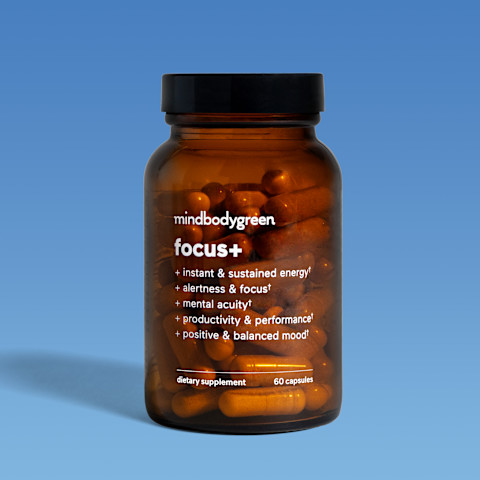
In a perfect world, you'd breeze through your day feeling incredibly alert and sharp. In reality, life has a way of keeping you from being on your mental A-game 100% of the time.
That can be tricky when you're expected to be on task during your entire workday. Happen to notice you're not quite as on the ball as you'd like to be? Incorporating these tips into your daily life can help!
Utilize your senses.
Using your senses—including your sense of smell—can help you stay focused during your day. Research has linked several essential oils, including spearmint1 and rosemary, to increased focus, learning, and memory. Try putting a few drops of either scent in a diffuser and enjoying the delicious smell when you need a pick-me-up.
Another hack: Use lighting to your advantage. Studies have repeatedly found that being exposed to bright light2 during the day—and cool lighting (like blue light), in particular—helps reinforce your body's natural circadian rhythm, allowing you to feel more alert when you should be (i.e., when you're at work). If you're able, try to sit near a window while you work, or have a lamp with a cool-toned or bluish bulb next to you at your desk.
Eat foods that give you energy.
What you eat can have a major impact on your ability to focus during your day, says Jessica Cording, M.S., R.D., CDN, a registered dietitian, health coach, and author of The Little Book of Game-Changers. "Having the right balance of protein, fat, fiber, and complex carbohydrates will help keep your blood sugar stable during the day—and that will promote stable energy levels and focus," she says.
Carbohydrates are "the best fuel for your body," says Keri Gans, RDN, dietitian and author of The Small Change Diet. But, she adds, some break down more slowly in the body. She recommends reaching for the following:
- 100% whole grains
- Fruits
- Legumes
- Vegetables
While these foods "provide longer-lasting energy," Gans stresses that it's crucial to pair them with protein and fat to keep your blood sugar (and focus!) in check.
Avoid foods that can bring you down.
Making sure to get a healthy mix of fruits, vegetables, and whole grains in your diet, as well as protein and fat is important. But it's also crucial to avoid certain foods that will work against you, Gans says.
"Cookies, cakes, and candy provide a big boost [of energy] and then a crash," she points out. Cording agrees. "Limit simple carbohydrates," she says. "They'll make you feel sluggish, and then it's hard to focus."
Take advantage of a focus supplement.
Focus supplements can help you get certain nootropic nutrients and phytonutrients (hello, plant brain power) in your diet that will help you stay on task.*
"If you're not getting enough of certain nutrients, adding them in will of course help," Cording says. She lists vitamin D, vitamin B12, iron, choline, and omega-3 fatty acids as essentials to help you focus.*
Not sure where to start? mindbodygreen's focus+ supplement contains ingredients like caffeine (both instant- and sustained-release), L-theanine, vitamin B12, Panax ginseng, organic lion's mane, and guarana to help you stay alert and totally in the zone during your day (i.e., sustained energy without the afternoon crash).*
Schedule mental breaks.
"You can't be focused for eight hours straight," says Thea Gallagher, PsyD, clinical assistant professor of psychology at NYU Langone Health and co-host of the Mind in View podcast. "Your attention span is short, and there's a critical mass that you reach." She recommends scheduling "planned distraction time" when you allow yourself a certain amount of time to check out Instagram or go for a short walk.
That could mean working for 30 minutes straight and setting a timer for a five-minute break, or some variation of that. "Use it as an incentive to stay focused," Gallagher says. After you let your mind wander for a bit, it'll be easier to hunker down again.
Add snacks to your day.
Your blood sugar stability has a big impact on your ability to focus. "It's easy to feel less alert when our blood sugars start to drop," says Gans. "A midmorning or midafternoon snack can definitely provide a boost in energy."
She recommends having a cup of plain Greek yogurt topped with strawberries for protein and fiber, a serving of almonds with a small apple for fat and fiber, or an energy bar to help tide you over until your next meal.
Exercise regularly.
Movement is crucial for your brain—a 2019 Frontiers review3 shows that physical activity is an important factor in healthy brain function. Specifically, moving your body helps increase blood flow, ensuring oxygen and nutrients reach your brain and promoting optimal brain activity. It also supports the production of neurotransmitters dopamine, serotonin, and norepinephrine, which affect everything from motivation and mood to attention, focus, and learning.
On the flip side, lack of physical activity can negatively affect your brain health. One 2018 study4 published in Frontiers had students from elementary, middle, high school, and college walk for 10 minutes before doing a slew of memory-based and problem-solving tasks. As a whole, those who walked beforehand performed better on the tasks than those who didn't. So, if you want to stay alert throughout your workday, refresh your mind by stepping away from your desk and walking around the block.
Stay on top of your hydration.
"Staying hydrated is 100% important," Gans says. "Failing to drink enough water can definitely make you feel less awake." Not having enough fluids can also leave you feeling "sluggish," Cording says.
Hydration needs are different for everyone, but in general, the U.S. National Academies recommends that men and women have approximately 125 and 91 ounces of water5 a day, respectively. That's about 11 to 16 cups, FYI. To help you meet your hydration goals, Cording recommends keeping a reusable water bottle on hand—it'll remind you to drink up.
The takeaway.
Making certain lifestyle choices during your day-to-day life can promote cognitive health and overall well-being—both in and out of work. Try these little tweaks to improve your focus and stay alert.
5 Sources
- https://pubmed.ncbi.nlm.nih.gov/27527000/
- https://pubmed.ncbi.nlm.nih.gov/10373104/
- https://www.frontiersin.org/articles/10.3389/feduc.2019.00105/full
- https://www.frontiersin.org/articles/10.3389/fpubh.2018.00100/full
- https://www.nationalacademies.org/news/2004/02/report-sets-dietary-intake-levels-for-water-salt-and-potassium-to-maintain-health-and-reduce-chronic-disease-risk

